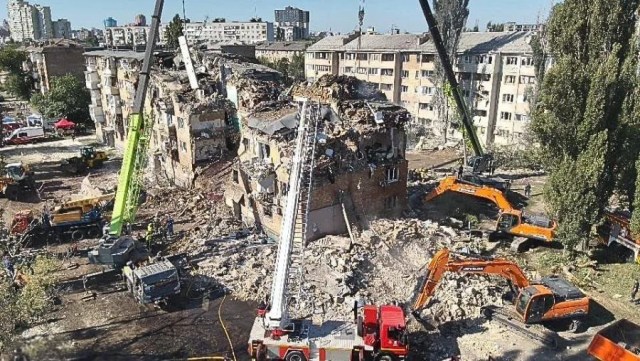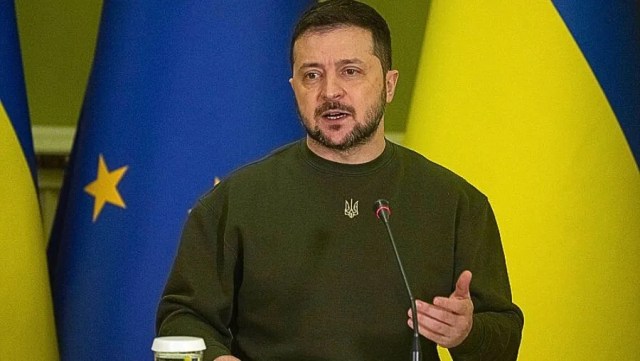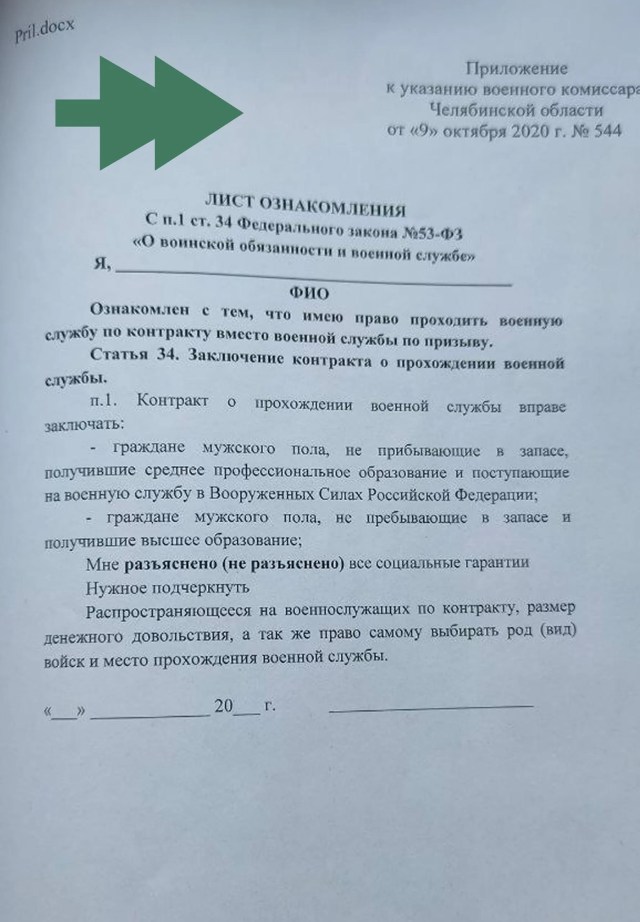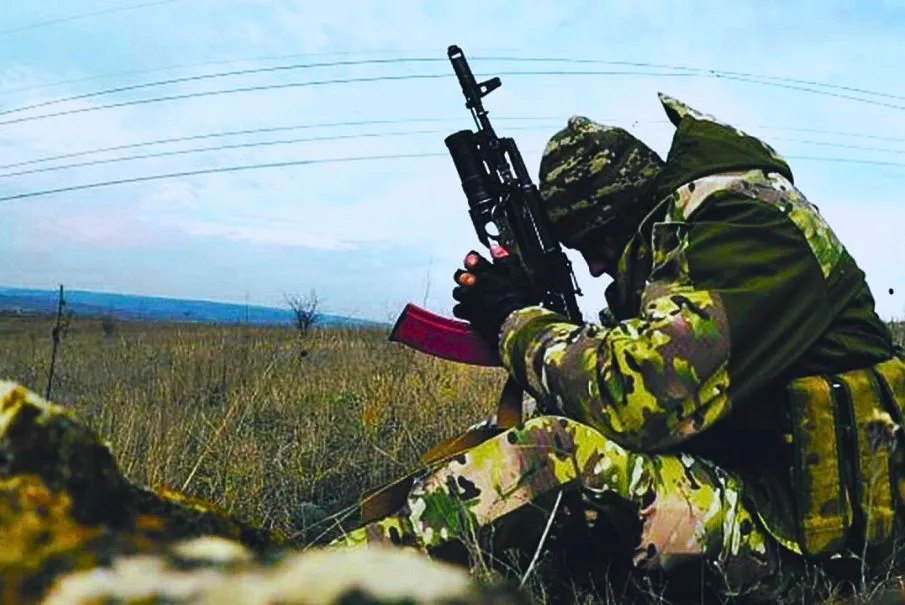It is a bitter arithmetic of this war: the more fiercely Moscow targets the Ukrainian hinterland with drones and missiles, the more united Ukraine's home front becomes - and the more visibly the edges of the Russian system fray. All numbers, voices, and findings of recent weeks tell the same story. In July, according to the Ukrainian Air Force, Russia fired 6,443 projectiles into the sky - 6,245 drones, 198 missiles - a new record. In August the wave ebbed to 4,216, but not a single night passed without attacks; three nights saw more than 500 projectiles each. Interception rates remained high, the human toll remains devastating. And yet: anyone reading these numbers as a sign of Ukraine's willingness to capitulate or to trade land fundamentally misunderstands the political psychology of a country that has learned to remain sober under a state of emergency.

The most recent polls, even those cited by Russian state media, capture the longing for a quick ceasefire - a universal, deeply human desire. But what these same surveys also clearly show, and what is often omitted from headlines, is that a clear majority rejects territorial concessions, and only 15 percent would even consider giving up territory that is not yet occupied - precisely the maximalist demand on which Vladimir Putin insists. The staunchest opponents of such concessions are those who know the price of retreat best: the soldiers. "The war does not end as long as our territories are occupied," says a fighter at the Zaporizhzhia front. Another one from the Sumy region formulates the simple logic of frontline life: "What kind of peace would that be, where the enemy continues to trample our land and we are not allowed to shoot back?"

That this toughness is combined with political realism is no coincidence. Trust in leadership in Ukraine acts as a seismograph of cohesion. In 2019, after Volodymyr Zelensky's election, trust levels were at 80 percent, then fell rapidly, exploded to over 90 percent after the invasion, and settled at around 60 percent in 2024. But every time external pressure rises - whether from Russian attacks or attempts to push Kyiv into land-for-peace talks - the ranks close. When Donald Trump, after returning to the White House, suspended military aid and publicly urged Kyiv to make "concessions," Zelensky's approval ratings rose significantly. In crises, democracies rally around their legitimate voice - provided it remains steadfast. This is the political constant behind the changing curves.

"Boxes of goods for soldiers" - this is what volunteers call their care packages for the front. But more and more often they report that these boxes remain empty because willingness to donate has dramatically decreased. Where clothing, drones, or food used to be shipped daily, today warehouses stand empty, and many collectors openly speak of exhaustion. Fewer and fewer people are willing to invest time and money into the war - a silent sign that support for the campaign is waning.
At the same time, the foundation is crumbling on the other side. In Russia's border regions, formerly passionate pro-war volunteers report burnout, corrosion, and sheer exhaustion. The movement that since 2022 had been procuring uniforms, thermal imagers, and drones is depleted. "Constantly awful" is how an organizer from Bryansk region describes the situation; calls for donations go unanswered, small contributions of 500 to 1,000 rubles dry up, businesses say they are on the brink themselves. One supplier gave up completely after fighters allegedly squandered nearly 100,000 rubles he had wired for equipment in a bathhouse on the very same day. This is more than anecdote. It is a metaphor for a state that has been morally hollowed out and whose monopoly on violence is fraying at the edges. The case from Chelyabinsk is emblematic of a practice now spreading across Russia. Military commissariats are trying by all means to tie as many young men as possible to them even before they reach conscription age - if necessary with psychological pressure, half-truths, or forms whose significance neither the youths nor their parents fully grasp. Officially, the "information sheet" is not a contract but merely a confirmation that the conscript has been informed of his right to replace mandatory service with a contract. But the effect is the same: the state documents that the youth has been "informed" - a basis to force the conclusion of an actual contract later.

"Alexander is seriously wounded, but already back in contact with us and in good spirits. He is an incredibly strong person, a true fighter, a man! With such soldiers we are convinced that victory will unconditionally be on our side. The Volunteer Company is a family, and we do not abandon our own."
These statements show how strongly cohesion is emphasized in pro-Russian volunteer groups, whether sincere or not - even severe injuries are placed at the service of war propaganda to spread rallying cries.
In addition, commissariat staff often try to reassure: one will "not be sent to Ukraine," it is "just service in the barracks." In reality, however, every signed contract obliges unconditional obedience to orders - including possible deployment to the combat zone. This turns a seemingly harmless information sheet into a lever that can decide over life and death. For many parents, going to the military commissariat has become an ordeal. Those who accompany their children must not only be familiar with the legal intricacies but also have the courage to refuse instructions or signatures. Mothers repeatedly warn on social media that children who come alone from school could easily fall into this trap. The real goal of the system is clear: not just to register conscripts but to bind as many of them as possible by contract to make up for personnel losses at the front.

This form is the first lever to build pressure. Formally it is only an acknowledgment of briefing, but in practice it creates a kind of paper trail: the commissariat can later say that the youth was informed and thus "voluntarily" had the opportunity to sign a contract.
This practice shows how great the pressure on the Russian military has become. Instead of protecting young people, the state is doing everything to draw them into the machinery of war as early as possible. Once someone is recorded, registered, and has signed, there is hardly any way left to escape the military logic. That is why experienced parents strongly advise: do not sign anything hastily, read every briefing carefully, insist on your rights, and seek legal advice if necessary. In a country that confronts its youth with forms instead of future prospects, vigilance is the last line of defense. Proximity to the front amplifies distrust. In Shebekino hardly anyone wants to rent to soldiers anymore; car washes and parking lots refuse access to military vehicles for fear of drone strikes. Air defense systems are set up in tree lines next to residential areas, HIMARS not only hits hardware but entire neighborhoods. Tanks that crush civilian cars are treated as collateral damage that disappears before it is recorded. Parents tell children to cross to the other side of the street when they see soldiers. Living like this teaches people the difference between "protecting" and "endangering" anew - a silent erosion of the internal narrative.


How much occupation destroys is shown by a look at Donetsk, where there is a historic drought of a political kind. In Russian-controlled eastern Ukraine, water has long since become currency. Officially it runs "every three days for a few hours." In practice, pipelines run dry for weeks; people fill bathtubs, collect drops from air conditioners, discuss in chats how many bottles are needed for a quick wash. Nurses report having to wash the wounded with "their own blood"; photos show yellowish liquid from rusty taps. Those with wells are kings, those without line up for hours at water trucks - often in vain. The Siverskyi Donets-Donbas canal, lifeline of an already arid region, was heavily damaged in the war; reservoirs like Starokrymske are drying up again. The hastily built Don-Donbas pipeline does not meet demand, corruption scandals line the route. Local forums deliver a devastating verdict: "Here they govern by one principle: leave nothing behind."
The extent of the crisis is no longer denied even by the Kremlin. In a meeting with Denis Pushilin, the head of the Russian occupation administration in the "DNR," Vladimir Putin admitted that water supply in the occupied cities has been reduced to a minimum. Pushilin reported that in Donetsk and Makiivka water now flows only once every three to four days for a few hours, in Mariupol at least every two days - and that losses in the dilapidated pipeline network reach up to 60 percent in some places. Putin confirmed that he had been "informed of massive losses during transport" and that even the newly built water pipeline does not solve the problem. This is an admission by the Russian leadership that it neither has infrastructure under control nor can ensure the basic supply of the population.
This water crisis is not a "natural event," it is the materialization of political occupation. Infrastructure that was painstakingly kept stable under Ukrainian administration is decaying under a governance whose priorities lie elsewhere. Those in Donetsk who pray for rain today are not hoping for good weather but for a minimum of dignity. "When I have half a bathtub, I feel safer," says one resident. It is the sentence of a society that has learned to measure prosperity not in money but in liters.

At the same time, the battlefield remains dynamic. Ukrainian air defense reports having intercepted or neutralized over 85 percent of drones and nearly 68 percent of missiles in August. The reasons for the temporary lull in Russian long-range attacks are unclear; Ukrainian strikes on Russian armaments targets are having an effect, while Moscow continues to cling to maximalist demands in the "peace talks" it initiated. The pattern is old: negotiation as a code word for buying time, terror against civilian infrastructure as leverage against societal resilience. It works less well the longer it drags on. After more than three and a half years of nightly bombardment, Ukrainians have taken to the streets en masse only once - not for "peace at any price" but for the independence of their anti-corruption agencies. Exactly there, in the core of the modern state, runs the line between exhaustion and erosion. When the president's office tried in July to bring NABU and SAPO to heel, mistrust rose, the EU and US intervened, and the plan was scrapped. Lesson learned - and politically paid for. Against this backdrop, the demand that Ukraine should be "realistic" and trade territory for an end to attacks sounds like cynicism in diplomatese. Realistic is what those affected experience as reality: an army that gives up hands the war to the children; a society that wrings water from the air knows that deprivation is not a law of nature but of governance. And a democracy under fire is allowed to make mistakes - as long as it corrects them.
Thus the core remains immovable: yes, Ukraine wants peace. But not the kind that tears pieces from maps and merely freezes violence. Not the kind where the enemy continues to stand on its own soil and one is supposed to take the finger off the trigger. Not the kind that leaves Donetsk thirsty and Bryansk cynical. But the kind that restores borders, law, and dignity. Anything else is not peace but a pause for the next war.
And so once again a piece of research ends with the realization: What times we have come to.
Investigative journalism requires courage, conviction – and your support.
Behind every article – especially our in-depth investigative reports – lies significant journalistic effort and financial investment. We do not wish to fund our work through paywalls, but through your voluntary support. How often and in what amount you contribute is entirely up to you – whether as a one-time or recurring contribution.

Ich bewundere die tapfere Menschen in der Ukraine.
Sie stehen gemeinsam gegen einen schwer übermächtigen Feind.
Einem Feind, der zig Mal größer ist und geschichtlich immer auf militärische Aggressionen gesetzt hat.
Einem Feind, der seine Kinder militarisiert (ich denke da an Euren aufrüttelnden Artikel)
Einem Feind, der dank neuer Allianzen hundert Soldaten aus Nord Korea in den Krieg schickt.
Und es steht trotz der halbherzig Hilfen aus dem Westen (keine Taurus „dank“ Scholz) und Einem Prin affinen US-Präsidenten.
Sie stehen trotz der Übermacht, die sich gerade beim Gipfel in China zeigt.
Wo stehen wir in Europa?
Wirklich mit aller Kraft an der Seite eines aufrechten Volkes?
Oder eiern wir zwischen Russland und der USA?